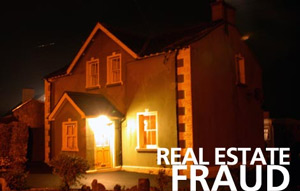
Real estate fraud is a serious problem now and always has been something to watch out for. Here are some examples of danger signals.
Property Flipping – A type of real estate investment strategy in which an investor purchases properties with the goal of reselling them for a profit. However, not all property flips are fraud, it is just a red flag and illegal flipping is another story.
From one end to the other these are deals that routinely involve valuations from appraisers who get money under the table, falsified loan applications, mortgage fraud, bait-and-switch financing, predatory loans with unconscionable terms and repairs which are not up to code and thus result in a house which may be neither safe nor habitable.
Chunking – Another common scam, where basically, there is a get-rich quick seminar to convince attendees to become investors. This is a scheme in which a fraudster sells an investor an overpriced property and pockets the difference. This is usually done in get-rich quick seminars.
As an example, Mr. Borrower attends a “seminar” or program that shows how to get rich by investing in real estate with no money down. A third party, Mr. Fraudster, possibly a presenter at the seminar/program, encourages Mr. Borrower to invest in three RE properties and acts as Mr. Borrower’s counsel/agent.
Under Mr. Fraudster’s guidance, Mr. Borrower completes the required application documentation for the transactions. Unbeknown to Mr. Borrower, Mr. Fraudster takes the applications and submits the information to 15 different lenders for 15 different properties. This scheme requires the assistance of an appraiser, broker, and/or a representative of a title company to ensure that Mr. Borrower does not have to bring money to the multiple closings.
Mr. Fraudster acts as an agent for Mr. Borrower at the 15 different closings. The net effect is that Mr. Borrower receives loan proceeds from three of the closings and Mr. Fraudster pockets loan proceeds from 12 of the 15 closings. The lenders are stuck with loans to a borrower who does not have the ability to repay the debt and are often forced to foreclose on the properties..
Nominee Loans/Straw Buyers – This involves a person who agrees to lend their name and credit but does not intend to actually be responsible for the property.
As an example, person A wants to buy a property, but convinces person B to step in as a “straw buyer” to obtain terms that person A could not. Alternatively, person A steals person B’s identity, and forges all of their information on the purchase and loan papers. In both cases, person B is not the person really purchasing the property, but their name is on the mortgage. In the first case, person B is fully responsible for the loan and everything else that goes on, as well as having committed fraud.
Fictitious/Stolen Identity – Same problem as straw buyers, but in this instance the identity is stolen or created out of thin air.
Just be careful of the get rich quick schemes. But regardless of this, it is a great time to buy real estate; in fact, I think it’s a buying opportunity of a life time..

